
Accepted presentation and paper for the Global Brain and the Future Information Society Conference within the International Society for Information Studies Conference, 3-7 June 2015, Vienna, Austria.
This brief presentation builds upon my recently published “Applied Collective Intelligence: Human-Centric Holistic Analytics, True Cost Economics, and Open Everything,” as published in Spanda Journal (Special Issue on Collective Intelligence), V. 2 / 2014 pp. 127-137.
My intent is to acknowledge the accomplishments and leadership of all those associated with the Global Brain Institute of Brussels, Belgium, and to respectfully suggest that additional emphasis on the human factor and a globally distributed World Brain comprised of human nodes, might radically enhance the future value of this established Institute.
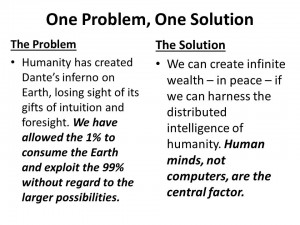
The problem, as I see it, is that We the distributed public, have abdicated our responsibilities as individual members of Humanity, and allowed the centralization of power and decision-making to the point that 1% of Humanity is destroying the Earth and repressing the creative potential of the other 99%.
The solution, as I see it, lies in empowering all distributed Humans, not in further centralizing decision making by augmenting the power of the 1% to centralize and control algorithms. Human minds, not computers, are the central factor if we are to have a future of peaceful prosperity.
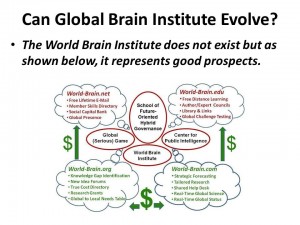
The World Brain Institute does not exist. I point this out, both to reassure those who question any mention of a World Brain Institute as an unnecessary competitor to the Global Brain Institute, and to drive the point home: adapt, evolve, and expand to embrace the human factor, or not, the human factor will remain foremost for so long as Humanity persists in the face of its own self-destructive ethos.
If the Global Brain Institute chooses not to evolve, I believe that an alternative leadership network will emerge, one that emphasizes the human over the computer, ethics over algorithms, shaping the future over automating the past.
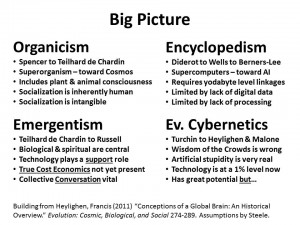
Here is the big picture, drawing heavily on Professor Francis Heylighen's article, “Conceptions of a Global Brain: An Historical Overview.” Evolution: Cosmic, Biological, and Social 2011 pp. 274-289. The assertions and assumptions are my own.
On the left are the two humanist tendencies with which I associate my own work. On the right are the two technocratic perspectives. Both are deeply under-developed, on the left because 99% of humanity is disenfranchised, relatively ignorant, unconnected, and therefore neutered; and on the right because computers are retarded — they are as good as their most stupid line of code, and they are at a documented 1% level of performance at this time — access to less than 1% of the total data available in the noosphere, and able to process less than 1% of the data they can access — hence, instead of artificial intelligence, we must be concerned about artificial stupidity — 1% of 1% is not what I would call a Global Brain by any stretch of the imagination.
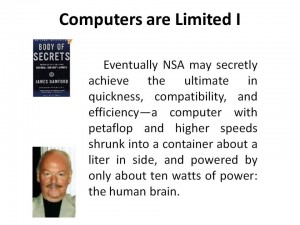
I am deep admirer of James Bamford, one of the most accomplished investigative journalists and authors of our time in relation to exploiting open sources of information against secret targets. Shown here is the last sentence on the last page in the last chapter of his book, Body of Secrets: Anatomy of the Ultra-Secret National Security Agency (Anchor Books, 2002).
Eventually [after trillions more in spending] NSA may secretly achieve the ultimate in quickness, compatibility, and efficiency — a computer with petaflop and higher speeds shrunk into a container about a liter in size, and powered by only about ten watts of power: the human brain.
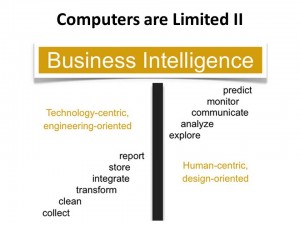
This graphic as shown was created by Stephen Few for his blog, Visual Business Intelligence, and posted there on Thursday, September 9th, 2010 at 9:26 am.
I will not belabor the obvious point: computers are limited to prior art and established code. While they can certainly learn and extrapolate from multiple instances of recurring events — provided the data is visible to them — and even if the data is visible a computer may not be able to see it, witness the many failures of computerized image detection and interpretation — computers cannot and will not in the foreseeable future excel at what humans can do best: intuit and create intangible knowledge.
These thoughts can be contested but we all — surely including myself — would appear to lack the multidisciplinary, multidomain, multilingual, multicultural perspectives required to fully appreciate this central assertion. [Cf. Graphic: Web of Fragmented Knowledge] Further conversation and research are needed, one reason I offer these thoughts to the conference participants.
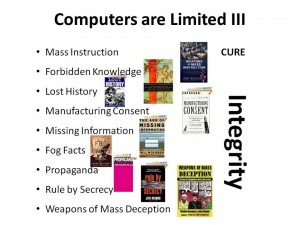
In fairness to computers — and their coders — this graphic easily applies to humans as well. These are standard information pathologies so prevalent they have their own book titles.
What we have found over and over again is that BOTH humans AND computers have great difficulty determining instances of false information in the absence of tangible proof to the contrary in direct experience.
With humans, mediocre educations and robust combinations of government and corporate lies with shallow universities, ideologically-insane think tanks, and totally corrupt and limited mainstream media outlets, conspire to allow the 1% to get away with looting the Earth and depriving the 99% of all that could be theirs for a fraction of the energy and time invested in war and greed.
With computers, I will simply repeat: 1% of 1% is not intelligent and it lacks integrity at multiple levels of understanding. “government by algorithm” is subject to extraordinary corruption and far removed from integral consciousness as uniquely achieved by ethical humans in community.
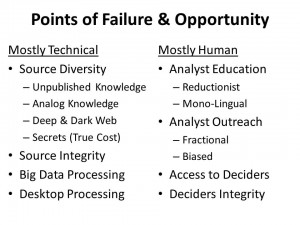
Here I sum up most briefly some points of failure that are obvious to me on both the technical and the human side of the Global Brain – World Brain opportunity.
I cannot overstate the depth of the ignorance of any existing or prospective computer in relation to all that is not digitial and even if digital is not visible to the computer. I also note that my own knowledge of the National Security Agency's processing less than 1% of what it collects is consistent with Mary Meeker's finding in 2014 that less than 1% of “big data” is processed, and from another corner of the universe, a finding that of all scientific papers written, only 1% of them are published. At the desktop level, we still do not have the integrated eighteen functionalities defined by Diane Webb and others at the Central Intelligence Agency in the 1980's.
On the human side I am appalled by the mediocrity of our overall education, intelligence, and research domains. The Western scientific tradition is reductionist to the point of extreme retardation when it comes to true cost economics and holistic analytics, and it is mono-linguals. Academics in my experience are — as are bureaucrats — very lazy and not held accountable for robust and diverse citations. Mono-lingual and even mono-institutional (MIT citing itself, for example) are the norm.
Beyond that, we have the “deciders,” individuals who have achieved discretionary authroity at the pinnacles of their organizations, be they private or public. These individuals lack integrity in multiple senses of the word, from being ignorant to being willfully uninformed to being corrupt to not caring about the consequences of their irresponsibility. No one is held accountable for massive failures with huge costs to the Earth, to economies, to societies, going hundreds of years into the future.
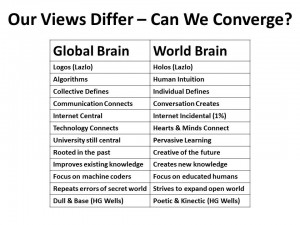
Our views on what is important differ. The most important question I can ask — the most constructive question, is simply, “Can we converge?”
The attributes of the Global Brain movement as I understand it, while no doubt imperfect, are sufficiently distinct from the attributes of the World Brain movement as I understand it very well, to suggest that there is an intellectual and moral zone between the two where both might fruitfully converge to better develop human networks at the same time that the computer networks are augmented by human understanding not now available to those pursuing new forms of artificial intelligence.
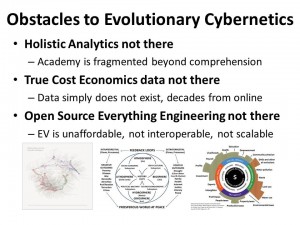
I could easily spend a year elaborating on these three assertions and constructively helping those who champion Evolutionary Cybernetics — which I embrace as a worthy calling — but here and now I will simply list the three things that I have been focused on and that I believe no one else is focusing on.
In my view, every university, every intelligence community, and every research program must begin integrating holistic analtics, true cost economics, and open source everything engineering. If they fail to do so, then Evolutionary Cybernetics is not affordable, not interoperable, and not scalable.
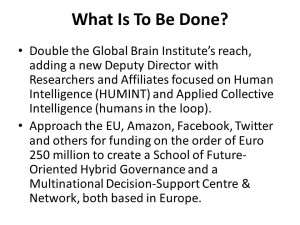
As I write this I am contemplating the swath of destruction that has been created since 9/11, from Central Asia through the Caucasus and the rest of Eastern Europe (which NATO had promised to NOT engage), and down through the Middle East and North Africa and then south and west to Niger and Nigeria.
I believe that Europe desperately needs intelligence with integrity — ethical evidence-based decision-support applicable to all ten high level threats to humanity, all twelve core policy domains, and all eight demographic challengers, several of whom are the immediate neighbors to Europe.
In my view, the Global Brain Institute, being located in Brussels, could be offered up as an antidote to NATO and as a hub for a new European alternative to NATO, one that focuses on what the Swedes and I call Multinational, Multiagency, Multidisciplinary, Multidomain Information-Sharing and Sense-Making (M4IS2). An Open Source Agency could be the parent to an M4IS2 Centre and Network, and a School of Future-Oriented Hybrid Governance with cadres from each European country — from each of the eight information “tribes” of Europe (academic, civil society, commerce, government, law enforcement, media, military, and non-government/non-profit) — very quickly trained in holistic analytics, true cost economics, and open source everything engineering.
It is time we put Voltaire's Bastards back in their box, and unleashed the creativity of humanity. Instead of elective wars we need innovative means of furthering peace with prosperity. I have no doubt that ending unilateral militarism, predatory capitalism, and virtual colonialism will be good for Europe, good for all those east and south of Europe, and good for the USA.
These ideas are a seed crystal. Lacking is the nurturing environment within which they might catalyze a transformation of our inherently human society.
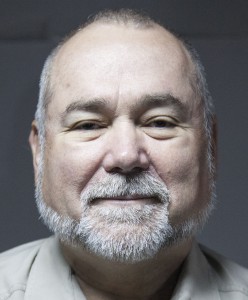
Robert David Steele is a native-born citizen of the USA, 63 years of age, resident in Oakton, Virginia. His formative years were spent in the Caribbean and South America as well as Asia, including four years in Viet-Nam (1963-1967). After earning an AB in Political Science at Muhlenberg College (thesis on multinational corporations and home/host country issues) and an MA in International Relations at Lehigh University (thesis on predicting revolution) he joined the US Marine Corps as an infantry officer, serving 4 years on active duty and 16 additional years in the Reserve. In 1979 he was selected to join the clandestine service of the CIA, and served there for nine years, in three back-to-back clandestine tours overseas including one where he was responsible for a terrorist target, and three tours in Washington DC dealing with counterintelligence, artificial intelligence systems, and satellite intelligence systems. He resigned from the CIA to accept an invitation from the Marine Corps to return to be the second ranking civilian in Marine Corps intelligence, responsible for co-creating the Marine Corps Intelligence Center, at the time the newest national intelligence activity in the USA.While in the CIA and USMC, he earned an MPA in Public Administration from the University of Oklahoma (thesis on strategic information mis-management) and also graduated with distinction from the Naval War College. He resigned from the Marine Corps civil service in 1993 after being ordered to stop promoting open source intelligence. For 20 years since then he has been the foremost international proponent for open source or public intelligence (decision-support), training over 7,500 mid-career officers from over 66 countries. He continues to believe that there is nothing wrong with America the Beautiful, or the world, that could not be fixed, and fixed quickly, by restoring integrity to how we elect and oversee our public officials.
See Also:
2014 Steele on Intelligence in Ecuador (English)
Search: humint [Human Intelligence] HUMINT + Meta-RECAP



